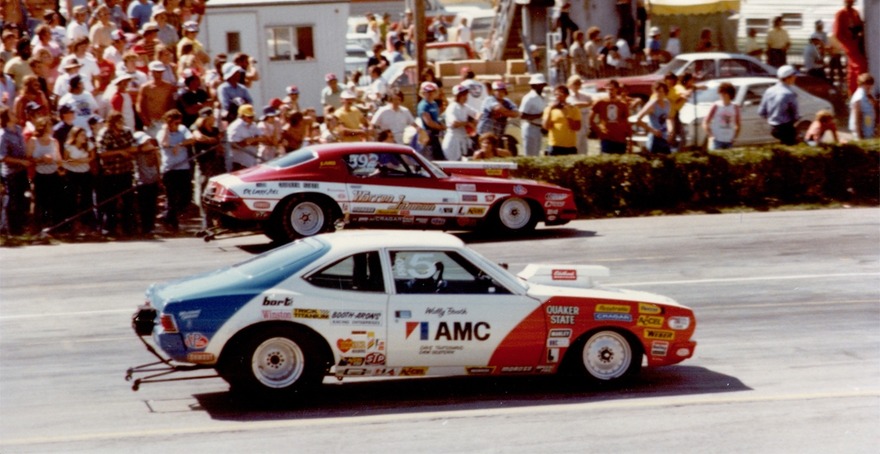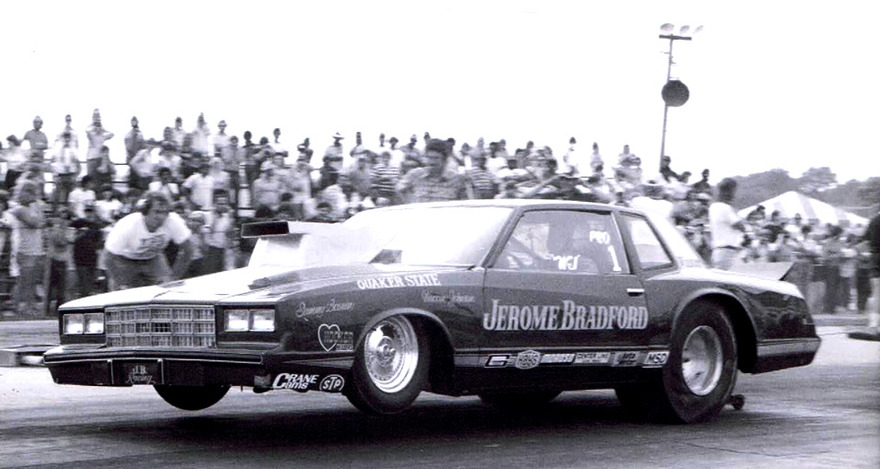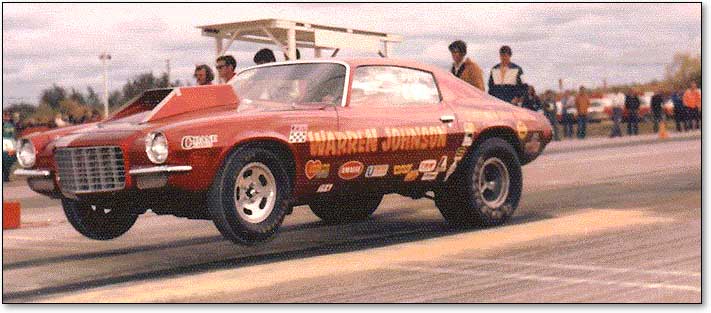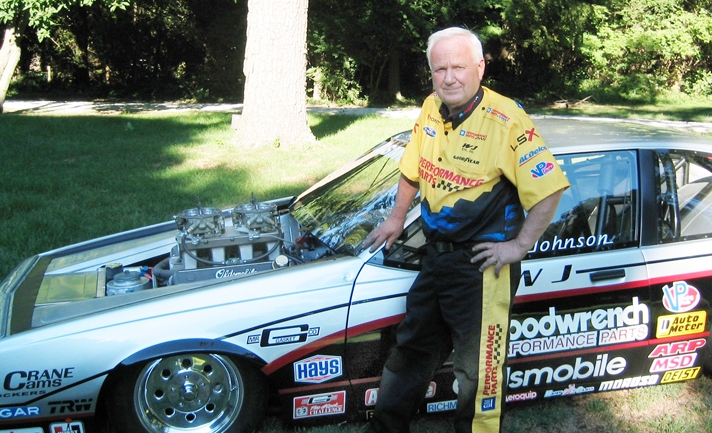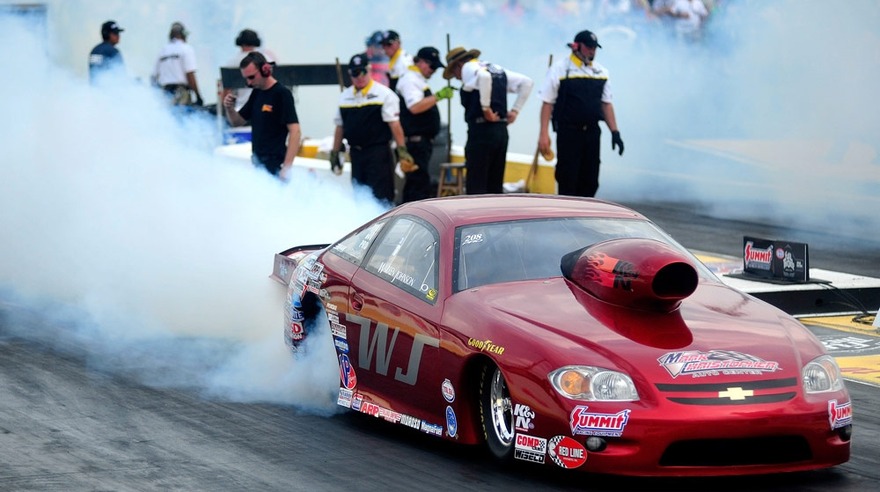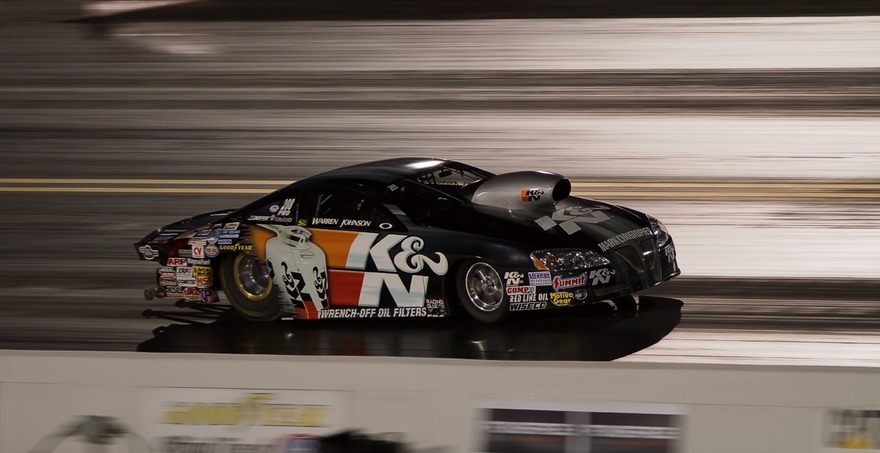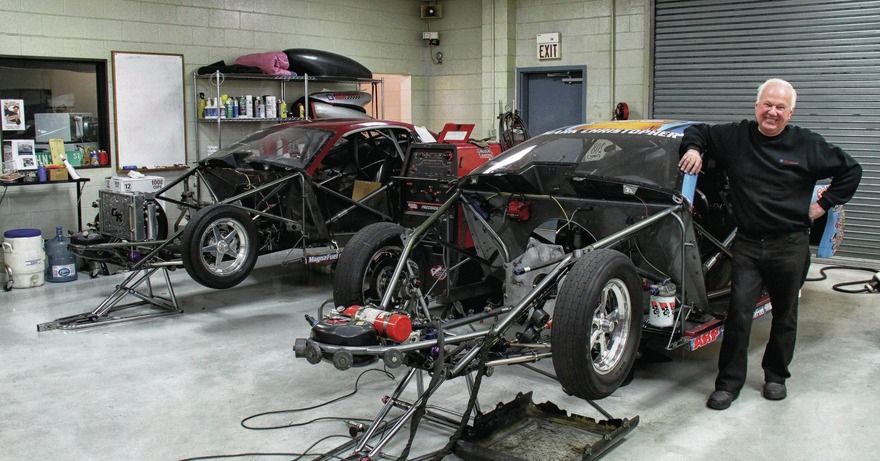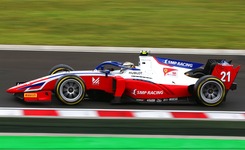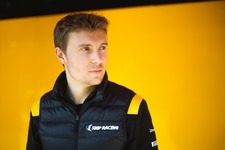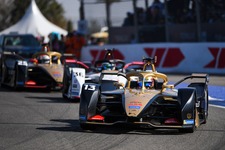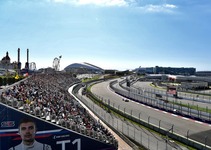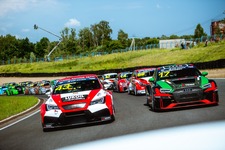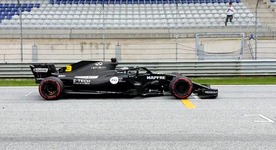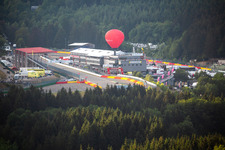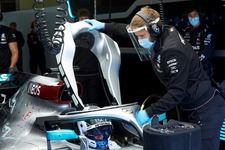«Drag racing — it's not rocket science. This is the most simplified form of engineering. You either won or lost. » Warren Johnson
Warren Johnson (Warren Johnson) dominated the nineties, as well as Bob Glidden (Bob Glidden) in the eighties, that is categorically and with only one goal. Six-time champion in the Pro Stock class 97 times ascended the podium throughout his career has beaten incredible number of records and statistics is the most victorious rider in the class, and in the absolute number of the won's Event is second only to John Force (John Force).
It is remarkable that with such an amazing amount of jewels Warren himself quite skeptical of his talents as a pilot, referring to what really interested him only the technical component of drag racing. That is why to him tightly «stuck» the nickname Professor (the Professor) before he first became the champion of NHRA.
In the world of pilots Johnson played exactly the same role as the spark plug — certainly important, but not decisive.
In an interview with Hot Rod Magazine in 2013, the question «Do Gives driving as much fun as the design and development of cars?» Johnson replied without hesitation: «Oh, no. When I started, Kurt (Kurt, son Warren, who later became a pilot in the class of Pro Stock) was too young, my wife Arlene (Arlene) do not want to mess with this, but the dogs did not give racing license. That's how I got into the cockpit. I simply had no choice. »
For Warren's main passion was motorsport engineering confrontation, the constant search for new design solutions and irresistible craving to win it at the expense of perfection of all the mechanisms of the car, rather than fight on the Strip, where the high-octane fuel burned is transformed into a boiling adrenaline. Anyway, the professor himself can arbitrarily belittle their abilities behind the wheel dregster, but in the classroom Pro Stock, he stands on top of any statistical category, whether it is the number of wins, finals, first place in qualifying or the best indicators of the time and speed on the individual stages.
Warren Johnson took part in more than 70%'s Event in the history of NHRA, half of which demonstrated the best speed of the weekend.
Warren was born in Minnesota in a farmer's family, where he was addicted to different kinds of glands, which on his father's farm was in excess and, after graduating from school, went to university on a specialty engineer, devoting all his spare time repairing and tuning engines for vodnomotornomu sports, circuit racing and, in fact, drag racing. Despite the fact that the formation of Johnson in his time succeeded no less than in the races at the quarter-mile, eventually alma mater, he gave up and concentrate on everything connected with races.
For example, one of the tests of relativistic mechanics of 139 students have been only two, and one of them, as you have already guessed, it was a future professor. The choice of class Pro Stock was determined more by geography than was the conscious decision of Warren: California, which gathered momentum nitromethane hysteria was very far away, as well as the West Coast, where rapidly grew Stock / Super Stock scene, and long winter is the best condusive to detailed and thoughtful work on increasing returns motors.
Long before Johnson became an icon of the global drag racing, he traveled thousands of kilometers from one strip to another across America on his thoroughly prepared Chevrolet 1957 until Arlene fussed with little Kurt. The first victory went to the future of six-time champion NHRA back in 1961 in his native Minnesota Dragway.
The first performance in the Pro Stock class was held in 1971 at the US Nationals. Warren built completely on their own in close garage Chevrolet Camaro qualified twenty-eighth out of 32 participants, but after the first round of the knockout rounds was forced to load his car back to the trailer. It was only after a long eleven years of hard work and thoughtful work professor took home his first Wally. Another decade took him out to bring together all the acquired knowledge and resources, and become a champion of the NHRA. Many famous pilots of the way to the summit took away a lot less time and effort, but, thanks to the infinite patience, perseverance and iron will Johnson rightly settled on the seventh line in the ranking of the top 50 pilots NHRA.
The key to success of Warren was that he had never competed with a specific driver, just as he was very far from competition between car manufacturers and sponsors, instead Prof. primarily focused on the most victory. He was not inherent personalization opponent, that is why in his best years, he was absolutely not care who it will swallow the dust of the strip behind it. His early career was not spoiled sponsors Johnson financial injections, and an aspiring pilot was forced to make a hobby of his life in fine-tuning their engines for the competition. With regard to the establishment of Warren as a pilot, he first notes the extensive experience of the winter races, resulting in his youth, thanks to which the professor was incredibly good on the Strip, the preparation of which was far from ideal.
In 1975, Johnson made the fateful decision and tied with amateur sport. The following season, he began performing in NHRA championship on an ongoing basis, not missing a single Event, and became the second at the end of the national championship. Available tridtsatidvuhletnego rider at that time were only the Camaro, the trailer and the wife of a younger son. In spite of the very satisfactory results (fifth in 1977 and seventh in 1978), winning the NHRA stages with incredible tenacity did not go, and Warren decided to try his luck in IHRA (International Hot Rod Association). The choice was rather nowhere and proved by the thirteen trophies and two league titles in three years.
And while evil tongues rustled behind that Professor took the path of least resistance, peremetnuvshis less prestigious series, pilots and the level of technology which was frankly weak, he honed his skills, constantly working on improving the competitiveness of his Camaro.
«I had to figure out how to win. The winners are not by chance. I just wanted to learn how to win, „- so says a veteran today, take time out in the NHRA.
In 1981, Johnson and his family moved to Georgia, where climatic conditions make it possible to engage in drag racing throughout the year, and a year later in the NHRA decided to move away from a comprehensive system that regulates the minimum allowable weight of the car depending on the power plant, in favor of a single all regulations : maximum displacement carbureted engine — 500 cubic meters. inch (8.2 L), and the mass dregster — not less than 2,350 pounds (1066 kg). Professor is back, and victory is not long in coming. On Summernationals in Inglishtaune Warren traveled to the finals confident the defending champion Lee Shepherd (Lee Shepherd). So long for its first victory did not go no pilot in the history of NHRA.
When the boss Oldsmobile decided to deploy a full-fledged program to participate in the NHRA Winston Championship in 1983, Johnson became the first man in whose house the phone rang with the proposal, which was impossible to refuse. The professor based his basic architecture Big Block Chevy engine and created the ultimate DRCE (Drag Race Competition Engine), the likes of which over the years has not been in the class. It DRCE twenty years later became the cornerstone for the development of a completely new engine, did not leave any chance rivals General Motors in zero.
In 1982, the first in the history of Warren, overcame the barrier of 180 mph, and four years later on the legendary strip in Indianapolis won the mark of 190 mph. In 1989, his account was already two dozen trophies NHRA. The era of seemingly invincible Bob Glidden was drawing to a close, and it was at this moment at the junction of decades, a new Pro Stock class king ascended the throne.
In the nineties, Johnson not only had no equal, he fully dominated season after season, winning five league titles in 1992, 1993, 1995, 1998 and 1999. In the remaining years, he consistently completed the championship on the second or third line of personal credit. For ten years, became the first professor for 30% of all stages of the national championship, it noted in 44% of the final rounds and joined the already impressive list of achievements of six podiums in the most prestigious event NHRA — US Nationals. In 1997, another bracket 200 mph collapsed under the onslaught of Johnson and throughout the 1999 season he was the first in the history of each (!) Stage showed the highest rate of events.
Almost every race weekend, if not ended with the trophy, the first place in the qualifying, the best time, maximum speed, anyway, remained behind Warren. In spite of the ten titles, even the great advantage of Bob Glidden at the peak of his career was not so overwhelming. Johnson was an incredibly long time to his success in the nineties and its armor-piercing perseverance and engineering talent paid for itself in full.
In 2001, Professor in the sixth and last time became the champion of NHRA. But as we have repeatedly seen in the case of other racers, champions of eternal does not happen, and the dominance of any one sooner or later come to an end. The first half of the two thousandth was held under the banner of Greg Anderson (Greg Anderson), which, incidentally, began his career in drag racing as a team chief mechanic Warren Johnson Racing. The best school is really hard to imagine, and four league titles Anderson direct proof. Son of veteran Kurt won nearly 39's Event NHRA (fifth result in the class), four times was the vice-champion and the first in the history of left and semisekundnoy zone (in the class of Pro Stock). Sam Warren finally hung up the helmet on a nail in 2013 and is fully focused on the design, construction and operational development of engines for a variety of motorsport disciplines.
In 2015, the question about the possibility of his return to the sport, the 71-year veteran said very clearly: «My son and I go back to the regular season as soon as only owning a sponsor that will allow us to perform at a competitive level. I do not want to come to a strip in order to arrive at the strip. If I come, it will come to win. »

